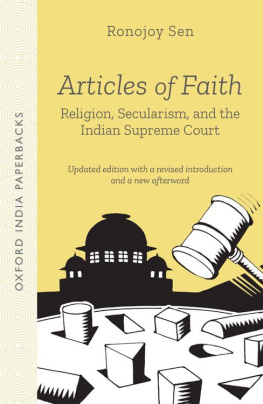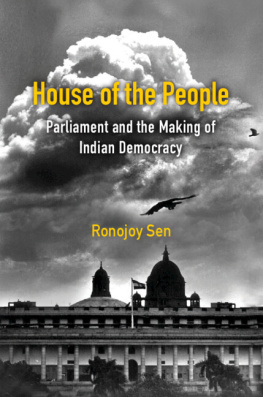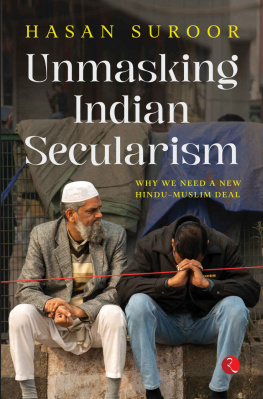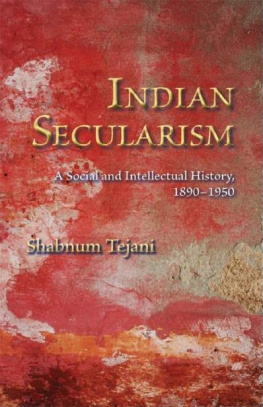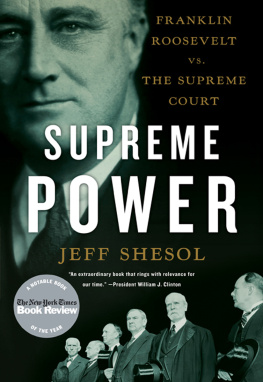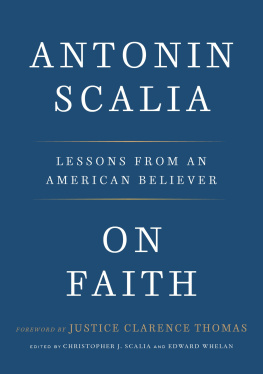Ronojoy Sen - Articles of Faith: Religion, Secularism, and the Indian Supreme Court
Here you can read online Ronojoy Sen - Articles of Faith: Religion, Secularism, and the Indian Supreme Court full text of the book (entire story) in english for free. Download pdf and epub, get meaning, cover and reviews about this ebook. year: 2018, publisher: OUP India, genre: Religion. Description of the work, (preface) as well as reviews are available. Best literature library LitArk.com created for fans of good reading and offers a wide selection of genres:
Romance novel
Science fiction
Adventure
Detective
Science
History
Home and family
Prose
Art
Politics
Computer
Non-fiction
Religion
Business
Children
Humor
Choose a favorite category and find really read worthwhile books. Enjoy immersion in the world of imagination, feel the emotions of the characters or learn something new for yourself, make an fascinating discovery.
- Book:Articles of Faith: Religion, Secularism, and the Indian Supreme Court
- Author:
- Publisher:OUP India
- Genre:
- Year:2018
- Rating:3 / 5
- Favourites:Add to favourites
- Your mark:
- 60
- 1
- 2
- 3
- 4
- 5
Articles of Faith: Religion, Secularism, and the Indian Supreme Court: summary, description and annotation
We offer to read an annotation, description, summary or preface (depends on what the author of the book "Articles of Faith: Religion, Secularism, and the Indian Supreme Court" wrote himself). If you haven't found the necessary information about the book — write in the comments, we will try to find it.
Articles of Faith: Religion, Secularism, and the Indian Supreme Court — read online for free the complete book (whole text) full work
Below is the text of the book, divided by pages. System saving the place of the last page read, allows you to conveniently read the book "Articles of Faith: Religion, Secularism, and the Indian Supreme Court" online for free, without having to search again every time where you left off. Put a bookmark, and you can go to the page where you finished reading at any time.
Font size:
Interval:
Bookmark:
This splendid effort explores how the judicial process in India has mediated between the state and the ideology of secularism by redefiningperhaps even narrowingthe meaning of religion and expanding the meaning of a democratic state. It is a book that is concerned with not only our past but also our future.
Ashis Nandy
Senior Honorary Fellow
Centre for the Study of Developing Societies, New Delhi
Ronojoy Sens innovative and carefully crafted study makes a major contribution to the understanding of politics and religion in India. It shows among other things how Indian Supreme Courts decisions based on Vedic rationalism have homogenized Hinduism. One starting result has been to justify the claim that Hinduism is a way of life, a result equally useful to Hindu nationalism and Nehruvian high modernism.
Late Lloyd I. Rudolph and Susanne Hoeber Rudolph
Professor Emeritus of Political Science and William Benton
Distinguished Service Professor Emerita respectively,
University of Chicago, Chicago
Though this book is part of the Law in India series, it would be a mistake to think that it deals only with law. It has profound relevance for independent Indias political, social, intellectual and, of course, legal history.
Tapan Raychaudhuri
Fellow (Emeritus), St Anthonys College, Oxford
Anandabazar Patrika
The breadth of analysis is striking. Sen provides a rich descriptive account of the Supreme Court, and manages to systematically organize the field of law and religion in a coherent and comprehensive fashion.
Madhav Khosla
Junior Fellow at the Harvard Society of Fellows
Harvard University, Cambridge
Seminar
In a work rich with historical information, legal insight and dexterous amalgamation of theory and empirical data, Ronojoy Sen examines the Indian practice of secularism through a study of the pronouncements of the Supreme Court.
Tanweer Fazal
Associate Professor, Centre for the Study of Social Systems,
School of Social Sciences
Jawaharlal Nehru University, New Delhi
South Asian History and Culture
[This] book is a thoughtful critique of what happens when a state institution interferes deeply in matters that it may not be best equipped to deal with.
Omair Ahmad
The Asian Age
The book has further enriched the wealth of scholarship on secularism. It should serve as a valuable source for students of law and Indian politics.
Mujibur Rehman
Assistant Professor, Centre for the Study of Social
Exclusion and Inclusive Policy
Jamia Millia Islamia, New Delhi
The Hindu
The book provides a nifty summary of the main position, the patterns of the apex courts rulings, and the historical sources of the judiciarys position when it tries to balance religious even-handedness on the one hand and religious reforms on the other.
Shylashri Shankar
Senior Fellow
Center for Policy Research, New Delhi
Financial Express
Sens writing style and arguments are lucid and make for a highly readable book.
Ratna Kapur
Senior Core Faculty, International Global Law and Policy Institute
Harvard Law School, Cambridge
South Asia: Journal of South Asian Studies
Sens argument is carefully crafted and convincing.
Raphael Susewind
Lecturer in Social Anthropology and Development
Kings College, London
Contemporary South Asia
Articles of Faith
Articles of Faith
Religion, Secularism, and the Indian Supreme Court
Ronojoy Sen


Oxford University Press is a department of the University of Oxford.
It furthers the Universitys objective of excellence in research, scholarship,
and education by publishing worldwide. Oxford is a registered trademark of
Oxford University Press in the UK and in certain other countries.
Published in India by
Oxford University Press
2/11 Ground Floor, Ansari Road, Daryaganj, New Delhi 110 002, India
Oxford University Press 2019
The moral rights of the author have been asserted.
First Edition published in 2010
Oxford India Paperbacks 2012
Oxford India Paperback Revised Edition 2019
All rights reserved. No part of this publication may be reproduced, stored in
a retrieval system, or transmitted, in any form or by any means, without the
prior permission in writing of Oxford University Press, or as expressly permitted
by law, by licence, or under terms agreed with the appropriate reprographics
rights organization. Enquiries concerning reproduction outside the scope of the
above should be sent to the Rights Department, Oxford University Press, at the
address above.
You must not circulate this work in any other form
and you must impose this same condition on any acquirer.
ISBN-13 (print edition): 978-0-19-948936-7
ISBN-10 (print edition): 0-19-948936-X
ISBN-13 (eBook): 978-0-19-909528-5
ISBN-10 (eBook): 0-19-909528-0
Typeset in 11/13.2 in Adobe Jenson Pro
by Excellent Laser Typesetters, Pitampura, Delhi 110 034
Printed in India by Replika Press Pvt. Ltd
For
Debakshi
Contents
This book is a small contribution towards understanding the place of religion in modern India and the nature of Indian secularism. While there are several possible ways to approach this complex task, I have chosen to do so by looking at the Indian Supreme Court judgments. This is not intended to be a comprehensive account of the Courts understanding of religion and secularism, but a discussion of judicial interventions in areas which, I believe, are important to the life of the Indian nation and Indian secularism.
Several public events have shaped the argument of this book, even though it might not be apparent from the text itself. The first was the riots following the assassination of Indira Gandhi, when I realized for the first time how my Sikh friends in school and their families in Calcutta became demonized overnight because of their religion. I felt the tremors of the Babri Masjid demolition in the distant environs of an American campus and worried about Indias future. Many years later, images of the twin towers of the World Trade Center crumbling on 11 September 2001, the 2002 Gujarat riots, and the 2008 Mumbai terror attacks would be defining moments of my journalistic career. One reaction to these acts of terrible violence, where religion or religious extremism could be seen to be central, might have been to argue for banishing religion from the public sphere. This book traverses an opposite path because I believe religion and religiosity were not at the heart of these violent events. This is, of course, not a novel position. More than anyone else, it was Mahatma Gandhi who through his life and teaching embodied this principle. I believe, too, that religious pluralism and tolerance are critical for the survival of the Indian nation. The book seeks to bring this view back to centre stage in the context of the courts in particular and public policy in general.
This book has not just been an academic exercise. It has also meant a re-evaluation of my own understanding of religion. Having grown up in a Brahmo family, where visits to houses of worship were few and far between, I had a dim view of religious rites and ceremonies. However, after marrying a practicing Hindu, I have frequented places of worship with greater regularity. Though this has not had any impact on my personal agnosticism, I have come to appreciate the faith of practicing believers. I remain optimistic that the uplifting as well as the quotidian elements of religion can triumph over its parochial and destructive side.
Font size:
Interval:
Bookmark:
Similar books «Articles of Faith: Religion, Secularism, and the Indian Supreme Court»
Look at similar books to Articles of Faith: Religion, Secularism, and the Indian Supreme Court. We have selected literature similar in name and meaning in the hope of providing readers with more options to find new, interesting, not yet read works.
Discussion, reviews of the book Articles of Faith: Religion, Secularism, and the Indian Supreme Court and just readers' own opinions. Leave your comments, write what you think about the work, its meaning or the main characters. Specify what exactly you liked and what you didn't like, and why you think so.

